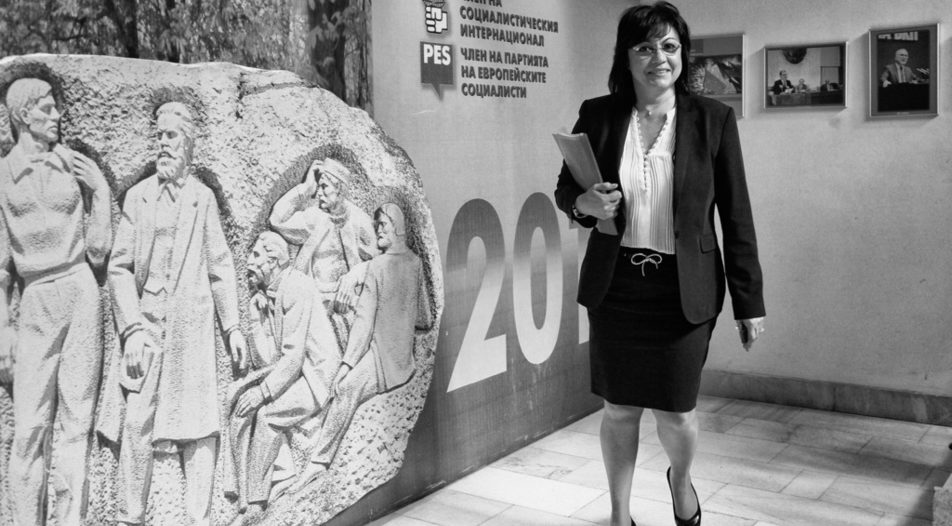"I won't disappoint you, I won't let you down! Together we will unite the party behind the left-wing idea and make it the force for change in Bulgaria," Kornelia Ninova, the newly elected leader of the Bulgarian Socialist Party, declared in front of the delegates at the National Palace of Culture in Sofia, the traditional conference venue of the party, in early May. Her victory over the incumbent chairman Mihail Mikov came as a surprise to many, as it seemed that Mr Mikov had managed to take hold of the party apparatus in the two years since becoming leader of the party. An old-fashioned Socialist, who was too busy pounding neoliberalism in his speeches in parliament to have the time to oppose some of the most controversial policies of Mr Borissov's second government, Mr Mikov was ousted by the joint effort of all business lobbies within the party.
Mrs. Ninova, on the other hand, seemed much more modern, assertive and outspoken, a force for good in the Socialist party that could both bring back the alienated hard-line electorate lost after the appointment of business mogul Delyan Peevski as chief of the state security agency in 2013 and open the party to voters tired of the dominance of GERB.
Mrs. Ninova started her career as an economist in two state-owned companies that were privatized during her tenure. She then became a shareholder in one of them. Mrs. Ninova rose through the ranks of BPS during the government of Sergei Stanishev (2005-2009) when she was appointed deputy economy and energy minister under Roumen Ovcharov, as well as board director of then state-owned Bulgartabac tobacco giant. The latter position put her in the sight of Delyan Peevski, who was then trying to take over the tobacco company. The prosecution investigated her, Mr Peevski and Mr Ovcharov of influence peddling, yet all charges were dropped due to lack of evidence. However, the three of them lost their public positions. Mrs. Ninova could have easily claimed to have been one of the first fighters against the state capture model, personified by Mr Peevski, that toppled the government of PM Plamen Oresharski in 2014, if it wasn't for her vote in support of the appointment of Mr Peevski as chief of the state security agency.
Mrs. Ninova issued mixed signals in the first few months as party chief. In the first days after her election she wore the St. George's ribbon (the Russian symbol of victory in WWII which became a popular sign of the pro-Kremlin forces that took over Crimea and the east of Ukraine in 2014) at a ceremony commemorating the capture of Nazi Germany's Reichstag by the Red Army in 1945. She also posed for a photo in front of a statue of Todor Zhivkov, the communist-era Bulgarian dictator. These moves were aimed at the hard-line BSP electorate, yet they did little to make disenchanted voters believe the Socialist party is modernizing itself. Under Mrs. Ninova BSP began to use much more vocal criticism and hostile rhetoric against GERB, yet rarely in a constructive manner. The legislation proposals that BSP put forward were mostly related ideas for increased state interference in the economy rather than the much-needed judicial, education and financial reforms.
Mrs. Ninova tried to outmaneuver the alternative left-wing parties by initiating talks for a joint presidential candidate (Gen. Roumen Radev, an ex-commander of the Air Force) and then emancipating him from those parties. By putting Mr Radev forward she aimed to please the Western embassies in Sofia, who see him as a successful NATO general, as well as Russia, as Mr Radev embraced the agenda of the left with regard to large-scale energy projects.
"I won't disappoint you, I won't let you down! Together we will unite the party behind the left-wing idea and make it the force for change in Bulgaria," Kornelia Ninova, the newly elected leader of the Bulgarian Socialist Party, declared in front of the delegates at the National Palace of Culture in Sofia, the traditional conference venue of the party, in early May. Her victory over the incumbent chairman Mihail Mikov came as a surprise to many, as it seemed that Mr Mikov had managed to take hold of the party apparatus in the two years since becoming leader of the party. An old-fashioned Socialist, who was too busy pounding neoliberalism in his speeches in parliament to have the time to oppose some of the most controversial policies of Mr Borissov's second government, Mr Mikov was ousted by the joint effort of all business lobbies within the party.
Mrs. Ninova, on the other hand, seemed much more modern, assertive and outspoken, a force for good in the Socialist party that could both bring back the alienated hard-line electorate lost after the appointment of business mogul Delyan Peevski as chief of the state security agency in 2013 and open the party to voters tired of the dominance of GERB.












